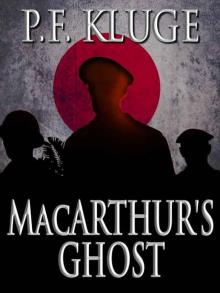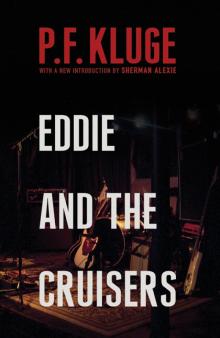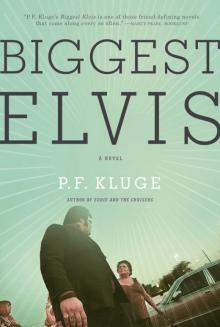- Home
- P. F. Kluge
MacArthur's Ghost Page 5
MacArthur's Ghost Read online
Page 5
“This is terrific!” Wingfield exclaimed. “Was this your doing, Cecilia?”
“I passed the information along,” Cecilia Santos said, but she stopped short of taking credit for Marcos’s presence on Corregidor.
“What about it, Hugh? You put in a word someplace?”
“Not me,” Beaumont answered.
“Well, we owe thanks to somebody,” Wingfield maintained.
“Maybe not,” Eddie said. “Could be, nobody pulled strings or dropped a name, or made a phone call, or called in a favor. Maybe it just happened. Because that’s Harry Roberts Harding out there. MacArthur’s Ghost is back.”
Marcos and Harding walked across the parade ground. Marcos was relaxed and lively, pointing out the Topside Barracks, the flagpole, the jungle. He was the picture of a host who was enjoying himself as much as his guest. Harry Roberts Harding nodded at Marcos’s comments, looked wherever Marcos pointed. The band stopped playing when the two of the men came up to where the veterans were standing, and now the silence was nearly absolute. There were no color guards, no bodyguards. It was just a couple of men walking across a field to where another group of men was standing. When they came close they stopped and stared. When you haven’t seen someone for half a lifetime, you have the right to stare. You offer yourself to them, they to you, and you conjugate your lives: here I am, there you are, here we are. And then you go into tenses, what you were, and are, and will be. That was what happened now. Harding stood there, scanning up and down the line, front ranks and rear, sorting out faces and memories. No rush about it. Then, Harding glanced at Marcos and made a little nod, which was answered by a little bow and they marched toward the Pacific War Memorial, camera crews and photographers scuttling around, ahead and behind. When Harding had gone fifty feet he stopped and turned back toward the vets, who were still standing quietly.
“Come on,” he said. It wasn’t a command, it was more like an invitation: come on, come along with me, there’s history somewhere down the road, we’ll make ourselves at home there, you’ll see.
Ferdinand Marcos was a charmer. He opened lightheartedly, joking about how, though the years had thinned the ranks, there were certain veterans who had thickened mightily. Then he turned serious. Whatever has happened to us between now and then, whatever we have done or failed to do, nothing can change what happened here. Nothing. He paused and surveyed the crowd, cocky, defiant, daring anyone to contradict him. Like a priest at a wedding he waited for someone to say why this ceremony should not proceed and he must have enjoyed the perfect quiet. The world was so full of complaints. Banners flapping in the breeze, the smell of jungle and the glare of heat: he seemed at home here, and Griffin had no problem believing that he had come because he wanted to. Next he launched into an affectionate, rambling introduction of Harry Roberts Harding. Someone once told him, he said, that the classic American hero was the tall, quiet, rugged man like Gary Cooper or Jimmy Stewart. They were right and wrong. The description was correct, but the names were the names of movie actors who, no matter whom they portrayed, remained actors. He knew the real thing, the authentic hero. Then he turned to Harry Roberts Harding. “Welcome home, my friend,” he said. And saluted him, a salute that Harding returned. Harding extended his hand for Marcos to shake. Marcos took the hand and pulled the taller man toward him, into an embrace.
“Wet hankies all around,” someone said. Griffin turned and there was Clifford Lerner, with Thomas Gibbins beside him.
“Hello there,” George said. “Tom, I thought you were off to New Zealand by now. The Milford Track.”
“Fucking beats hiking, he’s decided,” Lerner said. “He’s in love or something. May never leave.”
Gibbins stood there, avoiding Griffin’s eyes.
“The one with the long hair?”
“Yes.”
“It was all I could manage to drag him off to Corregidor today,” Lerner said. “Nice show, though. Beers, anyone?”
“Shh,” George said. Harry Roberts Harding was fussing with the microphone, trying to raise it. “I have to hear this.”
“Why?”
“I’m doing a book on him.”
“On Harding? Oh, my God, you must be joking. They don’t do books on war heroes anymore, George. Haven’t you heard? This is the age of the Strong Female Character. Not your line, boy.”
“Shut up, Clifford.”
“Come on then, Tommy,” Lerner said, acting hurt. “We’ll drink to your recovery, George.”
When Harding finished adjusting the microphone, he pulled a sheet of paper out of his pocket. Everyone assumed it was a speech that had been prepared for him, although Griffin wondered if it wasn’t just a piece of paper, a pretend speech that he was going to discard. In any case, Harding glanced at it, folded it neatly, and shoved it back into his pocket.
“I can’t lie to you people,” he said. “Not to you. I can’t even bullshit.”
A round of cheers and laughter, Marcos enjoying it enormously, a performer sensing he was in for a performance.
“Well,” Harding said. “I’m back. I was going to say ‘I have returned,’ but I hear that line’s been used. I forget who by.”
More laughter. Everyone relaxing. Just folks. No harm in a little irreverence at MacArthur’s expense.
“When I heard they were making a movie out here and wondering if I’d be interested, my instinct was to say no thanks, I’ll wait till it shows up on television, and that’s the night I’ll kick off my shoes and pop open a beer and try to convince myself that I used to be as good-looking as—what’s the name of the guy they’re paying to play me?”
Amusement on the speaker’s platform. No one seemed to know, till Eddie Richter whispered something to one of the Filipino cameramen who whispered it to someone else who whispered it to Marcos.
“Tom Selleck,” Marcos said.
“Who?” Harding leaned forward, as if he were a little hard of hearing or maybe it was to force Marcos to speak a little louder and thus prolong the joke.
“Tom Selleck!” Marcos shouted.
“He good-looking?” Harding asked. The president of the Philippines shrugged and passed the question back down the line, security man to cameraman to Eddie and back the answer came.
“Yes, very handsome,” Marcos said, mimicking the obliging eager-to-please manner Filipinos took with foreigners.
“Very handsome?”
“Yes,” Marcos said. And then the punch line. “Maybe.”
“Very handsome, maybe,” Harding pondered. “Well, Gary Cooper’s dead. And I’m not getting any younger. That’s why I came back. The more I thought about it, I couldn’t stand the idea of growing old and dying and not seeing this place, not being here, again, ever.”
Now he had them, every one. Laughing at his jokes, suffering his pauses and stumbles, his momentary awkwardness, ready to follow.
“The older you get, the more you look back. You look back because what’s behind you is an awful lot livelier than what’s in front. So I’ve been looking back and thinking about the past, not in a bragging way, but deeper. I’ve been wondering about what went right and what went wrong and how things turned out the way they did. I’ve been thinking about heroes. All kinds of heroes. The public heroes and the secret heroes. The liberation guerrillas.”
If Harding had not paused just then—whether by design or simply to give himself a rest—Griffin would have missed the look of puzzlement that crossed over Marcos’s face and the slight gasp of surprise from Cecilia Santos, just beside him.
“I’ve been thinking, maybe more than’s good for me,” Harding said. “About Roque Ablan and Jesus Villamor and Walter Cushing and Juan Olmos and Felipe Olmos and Felipa Cualala and my old friend Nestor Contreras. I think about him all the time. There were heroes whose chests were all covered with medals and there were heroes who were covered with nothing but earth. So I decided to come back and look around and see what I could find out about what was left of them and . . . left of me. I came ba
ck to keep some promises I made a long while ago. It’s time I kept them.”
He stopped, looking left and right, groping. There was a sense of loneliness about him, something forlorn, that made everybody root for him. He was a veteran among veterans and there wasn’t one of them who wouldn’t claim him. But there was also something separate. It wasn’t just that he had been a leader—the loneliness of command—and that his name resonated while others were forgotten. Harry Roberts Harding put himself apart.
“I guess I’ll wind this up now,” Harding said. “I hear the movie company’s got some cold beer in the shade and they wouldn’t mind if we drank some. Just one more thing. When that helicopter landed and I saw you and I saw your faces, which some I knew right off and others I kind of knew and some others God forgive me for not knowing . . . when I saw you standing there, well, nothing on earth could have moved me more. Thanks.”
The Marcos party left immediately after Harding’s speech and when Griffin joined the movie people inside their hospitality tent, he gathered that the abrupt departure bothered them.
“He made a goddamn beeline for the chopper,” Wingfield complained. “You’d’ve thought he was being evacuated or something.”
“What’d they say?” Hugh Beaumont asked.
“Press of duty, demanding schedule, et cetera,” Eddie Richter answered. “Could be true.”
“Does that mean you believe it?” Beaumont asked.
“I didn’t say that,” Richter answered.
“I think they feel they got booby-trapped,” Beaumont said. “I think they were annoyed.”
“And I can’t blame them,” Wingfield said. “We’ve got a problem.”
Puzzled, Griffin looked around the room for help. He’d thought Harding’s speech was great—way beyond the expected patriotic boilerplate.
“I guess you liked the speech, huh, Griffin?” Wingfield said.
“As a matter of fact—”
“May I have a moment?” Cecilia Santos asked. Griffin liked the way she took over. He’d underestimated her, he guessed, mostly wondering who—or what—it would take to get her to do something carnal. You couldn’t help wondering: her looks, her style, her whole manner encouraged it. But the mistake was thinking that was all there was. That was her doing. But it was his mistake.
“The Marcos government has gone—and can show it has gone —far out of its way in support of this project,” she said. “Your production will be featured at the film festival. You have unlimited choice of locations. You have the support, behind and in front of cameras, of the Philippine Armed Forces. This is generous treatment in a nation with many other problems on its agenda . . .”
“You’re right, Cecilia,” Beaumont said, as if to avert whatever was coming next.
“There is more,” Cecilia Santos continued. “The First Lady’s enthusiasm for cinema is well known. When you came, she welcomed you. And she induced her husband to welcome you as well, though, as you may know, he does not always share her enthusiasms. In return we ask very little: that you behave responsibly, all of you.”
“Responsibly?”
“That you not embarrass yourselves—or your hosts.”
“You’re right,” Beaumont said. “I don’t like it but you’re right. . . . Damn it, we’ve got a loose cannon on deck.”
“Loose cannon?” Griffin asked. “What’s going on here? I don’t get it.”
“Later,” Wingfield said, dismissing Griffin’s interest and turning to Eddie. “Is there any way we could send him back?”
Wingfield asked. “We paid him to come. What if we doubled the money and asked him to leave? Let him do his damn book in Florida. And take his writer with him.”
“No way,” Eddie said. “He’s here. We have to stay with our original plan.”
“Where’s Harding now?” Wingfield asked.
“Outside, with the old-timers,” Eddie answered.
“All right,” Wingfield said, arising. “Let’s mix and mingle for an hour. And then get the hell off of this rock.”
Corregidor was lovely late that afternoon. The sun slanted in from the west, burnishing the barracks, flushing out the last brightness in the grass and trees and sea below as if, what with night coming on, you might never see them again that green, that blue. Harry Roberts Harding was sitting at a picnic table, drinking beer and saying good-bye to his old comrades forever, no doubt: too late for exchanging addresses and making Christmas card lists.
“Hello, Eddie,” Harding said. “Are you done working for the day?”
“I wish,” Eddie answered, sitting down beside him. Griffin studied Harding closely. His height was the first thing you noticed. He was at least six foot two. The thinness was next. Words like gangly and lanky came to mind, western-sounding words that put you well on the way to thinking of him as the sort of frontier hero Marcos had evoked. There was more: the dark, swarthy skin, the kind of in-deep tan you don’t get on vacation, and the face, which was creased and leathery and outdoors-looking, western skin, western face. The eyes though were post-frontier, watery blue and red-rimmed by beer, or jet lag, or emotions. Wary eyes that were looking up at George Griffin and wondering, what now?
“This is George Griffin,” Eddie said, and Griffin looked at Harding as Harding looked at him. It was a dishonest exercise, thought Griffin, asking yourself whether someone looked like what you already knew he was. Sure, you could see the lineaments of a hero in Harry Roberts Harding. But you saw the same features pumping gas along interstates, or hitchhiking between small towns.
“I’m pleased to meet you, sir,” said Harding.
“Likewise,” Griffin said.
“So how about the speech?” Harding asked Eddie. “I hope it wasn’t too bad.”
“Too bad?” Eddie exclaimed. “The speech was just fine, Colonel.”
“I didn’t want to disappoint anybody . . .”
“When you speak the way you did—from the heart—you can’t let anybody down.”
“Everybody liked it then?”
“Oh, sure, they were pleased as punch,” Eddie responded. “Colonel, I forget if I mentioned it before or not, but I had this idea about your coming back here. That business about thinking things over, how everything turned out, trying to make sense of things, it sounded like you meant that.”
“Sure I meant it,” Harding said.
“The idea is, we’d get someone to tag along with you in the Philippines, and while you go around, he could write it all down —what happened back then, your memories, and what you’re thinking now and how it all adds up.”
“A writer, you mean . . .”
“That’s exactly what I mean,” Eddie said. “And George Griffin here is the writer that I have in mind.”
The tables were turned now. Griffin had looked at Harding and seen a man who might have been a hero. What did Harding see? What was he looking for? Someone he could use, command, confide in? Was he looking for a friend? An ear? An arm? A shoulder?
“What kind of write-up did you have in mind, Mr. Griffin?”
“A book.”
“A book. I see. Have you ever written a book, Mr. Griffin?”
“George is known mostly as a travel writer,” Eddie volunteered. “He does a column that’s in lots of newspapers, Faraway Places, Backyard Adventures, you probably’ve seen it . . .”
“I’m not sure.”
“And he’s done travel books galore. Guides that you take along. Where to shop and eat and the right hotels to stay in and side trips so you can get to know a country.”
“No,” Griffin said. The more he heard, the worse it sounded. “No, Colonel, I haven’t written a book. Those guides aren’t books. They’re confetti.”
“Confetti, compared to what he’s going to do with you,” Eddie said. “I think he could do a good job for you, Colonel.”
“Ever been here before? In the Philippines.”
“No.”
“Ever been in the service?”
“No.”
>
“Wrong age?”
“Wrong war.”
“Well,” Harding said. “I don’t know. I’m not saying yes and I’m not saying no. I want to think about it. Eddie, do you have anything scheduled for me tomorrow morning?”
“No sir, you’re clear till noon. There’s that ceremony out at the cemetery.”
“Another speech?”
“No, just a wreath.”
“Okay, Mr. George Griffin,” Harding said. “Suppose we get together tomorrow morning at my hotel. Around the middle of the morning.”
“We’ll be there,” Eddie said.
“No,” Harding corrected. “Just Mr. Griffin and me. Manila Hotel. The MacArthur Suite.”
CHAPTER 8
“Who the hell are you?”
An American stood in the entrance of the MacArthur Suite, a middle-aged, red-necked sloven in wrinkled khakis and a Snoopy T-shirt. If he was a civilian, it was in name only. His crew-cut testified you never knew when you might be called up, even though the astonishing beer gut that sagged across his cowboy belt was hoping it wouldn’t be soon. He was the sort of man who could fight like hell for two minutes. He’d be finished after that, but the first two minutes would be lethal.
“George Griffin. The colonel is expecting me.”
“It’s okay, Charley, he can come in.”
Harry Roberts Harding was sitting in an armchair placed on the verandah that overlooked the park below. Another chair had been occupied by Charley. Between them was a table with a dozen empty San Miguel bottles. It looked as if they’d been playing chess with beer bottles, and Charley had won big.
“Say hello to Charley Camper, George.”

 MacArthur's Ghost
MacArthur's Ghost Eddie and the Cruisers
Eddie and the Cruisers The Biggest Elvis
The Biggest Elvis